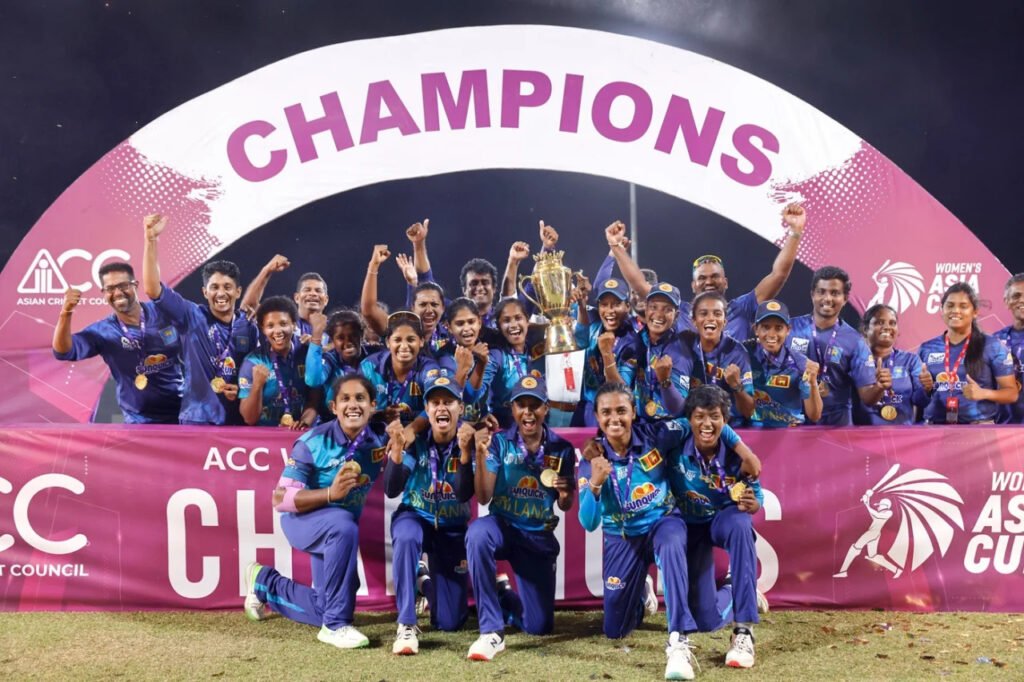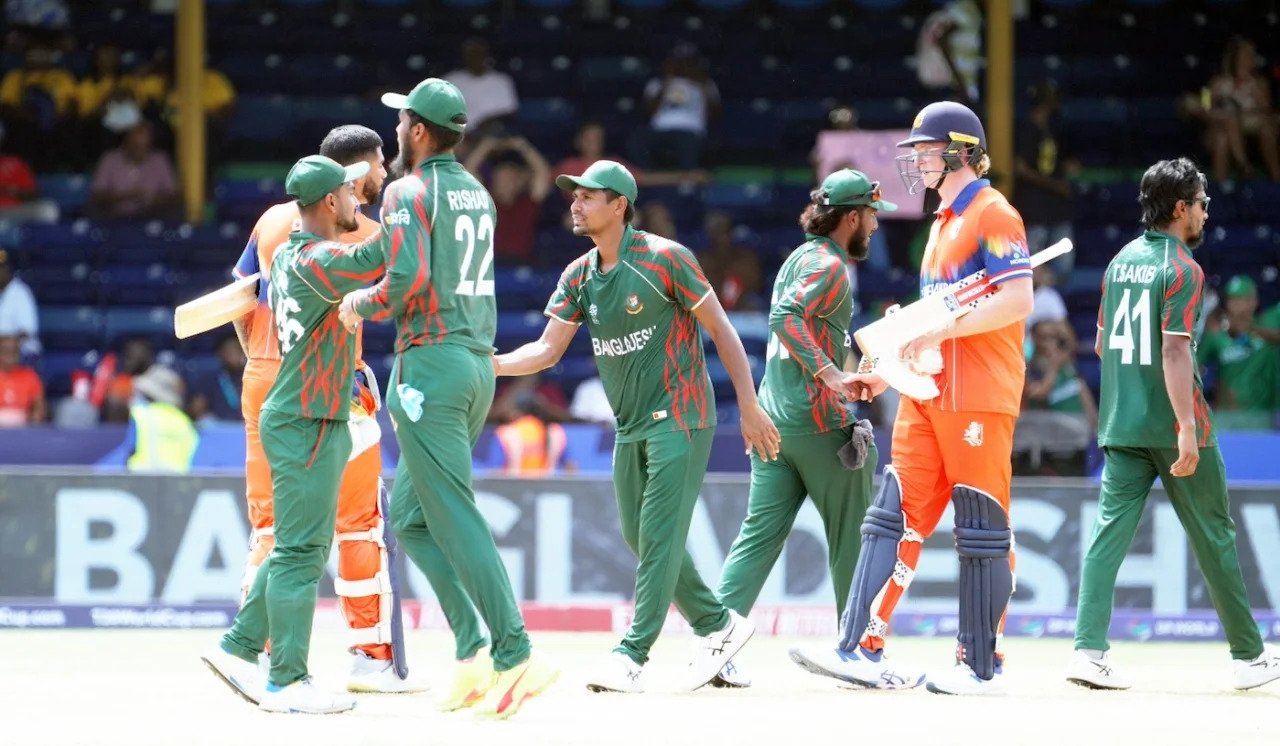Sri Lanka defeated India in a historic triumph to win the Women’s T20 Asia Cup for the first time.
With the all-around skill of Kavisha Dilhari and the outstanding performances of Chamari Athapaththu and Harshitha Samarawickrama, Sri Lanka won convincingly by eight wickets in Dambulla.

India 165 for 6 (Mandhana 60, Ghosh 30, Dilhari 2-36) lost to Sri Lanka 167 for 2 (Samarawickrama 69*, Athapaththu 61, Dilhari 30*) by eight wickets.
On Sunday, Sri Lanka made history by defeating India to win the Women’s T20 Asia Cup for the first time. The fighting half-centuries of openers Chamari Athapaththu and Harshitha Samarawickrama, as well as the all-around heroics of Kavisha Dilhari, were the highlights of Sri Lanka’s eight-wicket victory in front of a boisterous crowd in Dambulla.
The key aspect that Sri Lanka is not solely rely on its captain to perform was once again underscored by Samarawickrama and Dilhari’s valuable efforts in the final. They have already won 14 of the 17 Twenty20 Internationals this year, and they are quite confident and proud of their exploits heading into the T20 World Cup in October.
Despite posting a competitive score of 165 for 6, which was ultimately insufficient, India was boosted by Smriti Mandhana’s 60 and rapid fire shots from Richa Ghosh and Jemimah Rodrigues.
Up until the fifth over, nothing much happened. Then, with Sri Lanka on 28 for 1, Athapaththu went after left-arm spinner Tanuja Kanwar, who was new to the game. She smashed two full length deliveries for four and six to score 16 runs off the over and finish the powerplay on 44 for one after lofting a short ball to deep square leg for six.
The next over was bowled by another left-arm spinner, Radha Yadav, who gave up nine runs, six of which came off the bat of Athapaththu. Harmanpreet had to employ Radha and Kanwar against the two left-handers Athapaththu and Samarawickrama because the only specialist offspinner available was Deepti Sharma. Ultimately, the skipper of Sri Lanka scored 61 runs at a strike rate of 170.58, with 29 of those runs coming off left-arm spinners.
After six years of competing at the international level, Samarawickrama’s most significant knock occurred in Dambulla. Her career strike rate in Twenty20 Internationals is less than 100, and she had only struck four half-centuries in 61 appearances before. However, Sri Lanka required her to remain as long as possible on Sunday and to ignore those figures.
There was startled hush in the arena as Deepti bowled Athapaththu in the 12th over. With 48 balls to get 72 runs, Sri Lanka was in danger of an Indian rally. Samarawickrama took control of the game once she was set, scoring 29 runs off her first 27 balls, and she did so with elegance. Pull shots and slog sweeps showed her best game, and she ended up topping Sri Lanka’s total with an undefeated 69.
India was wounded by Radha’s 17-run 18th over, where Samarawickrama hit two fours and a six, when 25 was needed from the final three overs.
Strong bottom-handed batsman Dilhari contributed with an undefeated thirty off sixteen, and in the penultimate over, he clinched the victory with a six. For the third wicket, the pair combined for an innings-ending unbeaten 73 off 40 balls.
Also Read: Sri Lanka’s Victory Over Pakistan in Last-Over Thriller to Secure Women’s Asia Cup final 2024 Spot

As the game was slipping away, India had to deal with misfields, two missed catches, and tactical challenges. Harmanpreet made a blunder in the 15th over when Samarawickrama was on 45 when she failed to make a straightforward catch.
In the end, Mandhana showcased all of her expertise. During the powerplay’s first five overs, Sri Lanka dominated, with Mandhana scoring 14 runs at a cost per ball. However, she attempted to escalate the situation in the last over by scuttling across to create runs against Udeshika Prabodhani, a left-arm seamer. With three of her fours, India finished the powerplay at 44 for 0.
Mandhana punished anything too short or too full, notably from Athapaththu, who sped to her 26th T20I fifty off 36 deliveries, just after Shafali Verma and Uma Chetry were dismissed. In the sixth over, on 10 off 10, Harshitha dropped her at cover.
In the 16th over, Mandhana struck a straight shot at the bowler Athapaththu, but the ball bounced twice before it reached the batter, therefore it was ruled a no-ball and Mandhana was awarded a life as well. But Athapaththu dismissed the India opener in the next over with a superb running catch off Dilhari’s bowling.
Sri Lanka’s recent success has been greatly attributed to Dilhari. Her wicketless runs in 16 Twenty20 Internationals this year are only three. She also typically doesn’t give in much. The legspinner went for eighteen runs in her three overs and had claimed two wickets by the end of the 17 overs.
However, her penultimate over of the innings, which she bowled against Ghosh, was bittersweet. Ghosh attempted to cut the opening ball, which was a legbreak, and most likely gave the wicketkeeper an advantage. The bowler and the keeper made a strong appeal, but the umpire remained unimpressed.
Dilhari begged and disappointedly kicked the ground, but this event did not have DRS. Ghosh hit two fours and a six in the following three deliveries to push India beyond 150. In the end, Dilhari gave up 18 runs in her last over. In the end, Ghosh scored a 14-ball 30.





